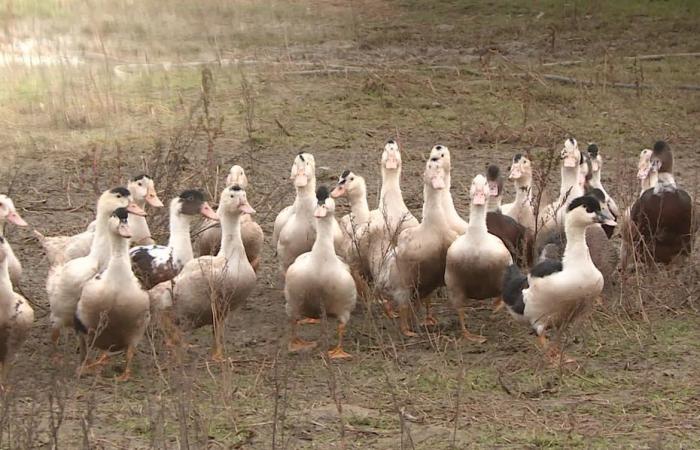
Cases of bird flu are increasing throughout Europe. From this Saturday, the risk level will therefore go from “moderate” to “high” everywhere in France and animals will have to be confined. The objective is to strengthen surveillance and prevention measures, but for many breeders, it is a disaster.
Company
From daily life to major issues, discover the subjects that make up local society, such as justice, education, health and family.
France Télévisions uses your email address to send you the “Society” newsletter. You can unsubscribe at any time via the link at the bottom of this newsletter. Our privacy policy
Avian influenza, known as bird flu, has spread more quickly among poultry in the European Union this year than in 2023. Experts fear a repeat of previous epidemics, which led to the deaths of tens of millions of birds. animals. For breeders, after several difficult seasons, it is a repeating nightmare…
The level of risk linked to avian flu in France is raised from “moderate” to “high”, the highest level, from this Saturday, November 9, according to a decree published on Friday, November 8, 2024 in the Official Journal, aiming to strengthen surveillance and prevention measures.
The decision was taken due to strong and persistent infection dynamics in migration corridors. The risk of the virus being spread by these migratory birds passing through French territory is very high. On the ESA health monitoring platform, epidemiological surveillance-animal health, the October bulletin already noted a very high risk of epidemic in Europe.
Avian flu: risk goes from “moderate” to “high” in Europe
•
© Weekly health monitoring bulletin
According to the Ministry of Agriculture, since August 2024, four outbreaks on farms and one in a farmyard have been counted in France. In the latter:
The genetic characteristics of the virus are identical to those of the viruses causing the outbreaks in Central Europe, which indicates a resumption of migration.
Ministry of Agriculture
Read: DECRYPTION. Avian flu: understand everything about the circulation of the virus with a researcher from the Toulouse veterinary school
The high level of risk implies that all poultry must be kept indoors throughout the metropolitan territory and that additional safety measures must be taken to avoid the spread of the disease.
In farms with more than 50 birds, poultry must therefore be confined but their feeding and watering must also be protected. In small farms, animals must be enclosed or protected by nets.
Lionel Candelon is a duck breeder in the Gers, and he doesn’t want to hear about the confinement of his animals. On his farm, he currently raises 9,000 ducks. Some are young and could be locked up without danger. But for adult ducks, it’s a different story. According to him, locking up animals in buildings, when they have been in the open air for several months, is even dangerous.
For me, it’s impossible, if I lock up adult ducks, they will go crazy! Like during Covid.
Lionel Candelon, duck breeder
The breeder believes that there is another solution to limit, or even avoid, the spread of avian flu: vaccination. He has already paid 3,000 euros to vaccinate his ducks. For him, the State should launch a massive vaccination plan and take charge of the 3rd dose of the vaccine necessary to ensure the immunity of animals and avoid their confinement.
Lionel Candelon, president of the regional union of rural coordination
•
© FTV
When I have my ducks tested before they leave, my fear is that the veterinarian will call me to tell me that the flu virus is present.
Lionel Candelon, duck breeder
The breeder believes that animals should only be confined if they show clinical signs of the virus. The decree comes into force this Saturday, November 9.





